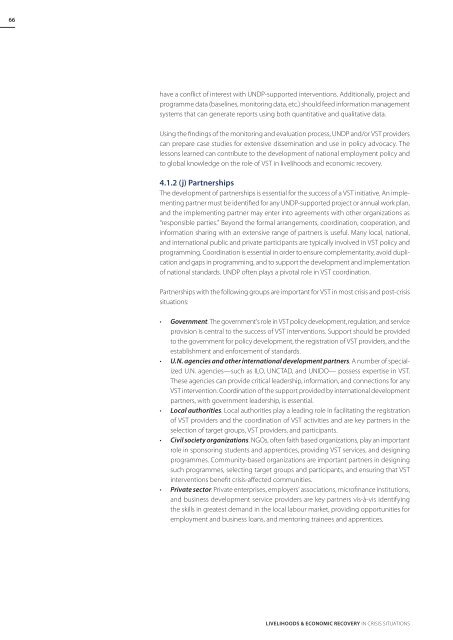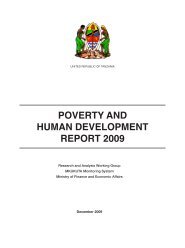Download PDF (4.08 MB) - ReliefWeb
Download PDF (4.08 MB) - ReliefWeb
Download PDF (4.08 MB) - ReliefWeb
You also want an ePaper? Increase the reach of your titles
YUMPU automatically turns print PDFs into web optimized ePapers that Google loves.
66<br />
have a conflict of interest with UNDP-supported interventions. Additionally, project and<br />
programme data (baselines, monitoring data, etc.) should feed information management<br />
systems that can generate reports using both quantitative and qualitative data.<br />
Using the findings of the monitoring and evaluation process, UNDP and/or VST providers<br />
can prepare case studies for extensive dissemination and use in policy advocacy. The<br />
lessons learned can contribute to the development of national employment policy and<br />
to global knowledge on the role of VST in livelihoods and economic recovery.<br />
4.1.2 (j) Partnerships<br />
The development of partnerships is essential for the success of a VST initiative. An implementing<br />
partner must be identified for any UNDP-supported project or annual work plan,<br />
and the implementing partner may enter into agreements with other organizations as<br />
“responsible parties.” Beyond the formal arrangements, coordination, cooperation, and<br />
information sharing with an extensive range of partners is useful. Many local, national,<br />
and international public and private participants are typically involved in VST policy and<br />
programming. Coordination is essential in order to ensure complementarity, avoid duplication<br />
and gaps in programming, and to support the development and implementation<br />
of national standards. UNDP often plays a pivotal role in VST coordination.<br />
Partnerships with the following groups are important for VST in most crisis and post-crisis<br />
situations:<br />
• Government. The government’s role in VST policy development, regulation, and service<br />
provision is central to the success of VST interventions. Support should be provided<br />
to the government for policy development, the registration of VST providers, and the<br />
establishment and enforcement of standards.<br />
• U.N. agencies and other international development partners. A number of specialized<br />
U.N. agencies—such as ILO, UNCTAD, and UNIDO— possess expertise in VST.<br />
These agencies can provide critical leadership, information, and connections for any<br />
VST intervention. Coordination of the support provided by international development<br />
partners, with government leadership, is essential.<br />
• Local authorities. Local authorities play a leading role in facilitating the registration<br />
of VST providers and the coordination of VST activities and are key partners in the<br />
selection of target groups, VST providers, and participants.<br />
• Civil society organizations. NGOs, often faith based organizations, play an important<br />
role in sponsoring students and apprentices, providing VST services, and designing<br />
programmes. Community-based organizations are important partners in designing<br />
such programmes, selecting target groups and participants, and ensuring that VST<br />
interventions benefit crisis-affected communities.<br />
• Private sector. Private enterprises, employers’ associations, microfinance institutions,<br />
and business development service providers are key partners vis-à-vis identifying<br />
the skills in greatest demand in the local labour market, providing opportunities for<br />
employment and business loans, and mentoring trainees and apprentices.<br />
Livelihoods & Economic Recovery in Crisis Situations





